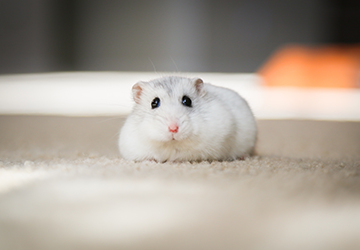Introduction:
Are you the proud owner of a hamster? Have you ever wondered how long your child can live with proper care and attention from you? Hamsters are unique, energetic little pets that have been beloved by owners for years. By keeping them alive with proper diet, water, housing and plenty of activity, even the smallest members of the family can enjoy an idyllic long life. But what is the average lifespan of a hamster as a pet? Let's find out together! In this blog post, we cover all the details you need to know about hamsters. We'll look at the factors that affect their lifespan, the average lifespan of different breeds, and how you can help your pet live a long and happy life. So if you're considering getting a hamster, read on to learn more!
An overview of hamsters as pets?
Hamsters make great pets for a number of reasons. They are small, cute and relatively low maintenance compared to other animals. Hamsters can be kept in cages, but they need more space than normal cages allow. So consider investing in a giant hamster habitat with plenty of room to move around and explore.
Because hamsters are nocturnal animals, they may not be the best pets for children who are used to interacting with pets a lot during the day. However, if you're willing to adjust your sleep schedule, you can still provide plenty of time for play and being together.
Hamsters need a diet consisting primarily of high-quality hamster foods, such as commercial hamster chow or fresh vegetables and fruits. Hamsters also need plenty of fresh water, which can be provided through bottles attached to the side of the cage.
Another important consideration is movement; hamsters should have ample opportunity to get out of the cage and explore the monitored area. This can be done in one area of your home or in the small pipes and tunnels you have set up for them.

All in all, hamsters make excellent pets if you are willing to give them the attention, care, and exercise they need to keep them healthy and happy. These charming critters can make adorable companions in the right environment and diet.
How long do hamsters live as pets?
Hamsters are popular pets for both children and adults due to their small size, low maintenance needs, and ability to entertain themselves. A popular question among would-be pet owners is "How long will a hamster live as a pet? "
Captive hamster life expectancy varies by species and sex. The most common pet hamster, the Syrian or golden hamster, has an average lifespan of two to three years, while the Russian dwarf hamster can live up to two and a half years. Female Chinese and Roborowski hamsters have an average lifespan of three to four years, while male Chinese and Roborowski hamsters tend to have a shorter lifespan of two to three years.
Providing a proper diet and environment is essential to ensure a long and healthy hamster life. Due to their size, hamsters should be kept in cages no smaller than 12" x 18". The cell should contain bedding that can hold urine and faeces, a feeding bowl, a water bottle and appropriate chew toys.
A hamster's diet should consist of a grain-based diet supplemented with fresh vegetables, fruits, and insects. Snacks can also be given in moderation. Also, it is important to give them time out of the cage each day and provide them with plenty of exercise.
With proper care and nutrition, your hamster can live a long and healthy life. Watch for signs of illness, such as trouble breathing or loss of appetite, so your pet can get help quickly. With the right amount of love and attention, your hamster will become a beloved member of your family.
What are the factors that affect the lifespan of hamsters?
A pet hamster's lifespan can be affected by a variety of factors that affect its health and well-being. Diet and nutrition are the most important, as hamsters need to get all the essential vitamins and minerals from their diet. Inadequate nutrition can lead to obesity, a weakened immune system, or other medical problems that can shorten a hamster's life expectancy.
Another factor that affects a hamster's lifespan is the environment it lives in. Hamsters need a clean, quiet place to live with plenty of bedding to burrow and nest in. Crowding or overcrowding with other animals (such as hamsters) can cause stress and make them more susceptible to disease.
A hamster's genetic makeup is also a major factor in its lifespan. Some genetic disorders can lead to health problems, such as heart or kidney disease, which can lead to early death. Therefore, it is important to buy from a reputable breeder who understands the breed and genetics.
Finally, regular veterinary check-ups are critical to monitoring your hamster's health and detecting disease early. Prompt treatment of health problems can help increase the life expectancy of your pet hamster, so it is recommended that you bring them in for checkups at least once a year.
If you follow these tips and provide the right care and care, hamsters can live 2 to 4 years longer than their average life expectancy. With attentive and loving owners, some hamsters may be lucky enough to outlive their life expectancy.
Different ways to help hamsters live longer?
Hamster owners are responsible for ensuring their hamsters live a long and healthy life. Here are some ways you can help your hamster live longer:
1: Ensure proper nutrition -
Hamsters should be fed a nutritious, balanced diet that gets all the nutrients and vitamins they need to stay healthy. Some important foods to offer your hamster include sunflower seeds, oatmeal, fresh vegetables and fruit, and a food mix made specifically for hamsters that provides essential vitamins and minerals. Avoid sugary foods for pets, as it can lead to obesity, diabetes, and other health complications.
2: Keep her cage clean -
A clean cage is essential to the health of your pet hamster. Clean the cage regularly, at least twice a week, with warm water and mild soap. Additionally, bedding in cells is changed frequently to reduce the risk of illness from bacteria and parasites.
3: Proper exercise -
To stay healthy and prevent obesity, hamsters need regular exercise. Make sure to give your hamster plenty of room to exercise and provide toys and other items to keep him active.
4: Monitor your health regularly -
It is important to check your hamster regularly for signs of illness or injury. Watch for behavioral changes, such as decreased appetite or increased sleep, and physical abnormalities, such as bumps or sores. If you notice anything unusual, take your hamster to the veterinarian for an examination. By following these steps, you can ensure your pet lives a long and healthy life.

Signs that a hamster's lifespan is coming to an end?
Like all other living things, hamsters have a long average life expectancy. Unfortunately, this lifespan is much shorter than in humans and can be as short as two to three years. As people age, signs of aging may appear, which indicate that their life is coming to an end. Some common symptoms are:
1: Lose weight -
Hamsters will begin to lose weight as they age, which may be a sign that the end is near. Weight loss can be due to age, poor diet, or disease. If your hamster loses more weight than usual, you need to take him to the vet as soon as possible for a checkup.
2: Slow down -
As hamsters age, their energy levels tend to drop, and they become more sedentary. If your hamster seems to be sluggish, take him to the vet for a checkup. This could be a sign that the end is near, or that they are getting older and need more rest.
3: Loss of appetite -
Another sign that a hamster is nearing the end of its life is that it has lost its appetite and isn't eating as much as it used to. It can also be caused by disease or age, so be sure to take your hamster to the vet for a checkup if this happens.
4: Behavior Change -
As hamsters get older, their behavior may also change, they may become more aggressive or less active than usual, and may not interact with you as much as they used to. If your hamster's behavior changes suddenly, it could be a sign that his life is coming to an end.
5: Incontinence -
Another sign that a hamster is nearing the end of its life is when it has an accident and becomes incontinent. This could be due to an age-related problem or disease, so if this happens, be sure to take them to the vet for a check-up.
If you notice any of these signs in your hamster, you must take him to the veterinarian as soon as possible. During this time, comfort and care should also be given to them, so that they can spend their last days with peace of mind.
Relevant Questions:
Q: Can hamsters live ten years?
A: While the average lifespan of hamsters in a home environment is between 1.5 and 3 years, in rare cases they can live up to 7 years - unfortunately there is no documented evidence that hamsters can live 10 years or more many. However, with proper care and nutrition, it is possible for some hamsters to live to this age. While ten years is not a realistic life expectancy for a hamster, it is still possible for a pet hamster to exceed the average life expectancy with adequate care and nutrition.
Q: Are hamsters good pets?
A: Yes! Hamsters make excellent pets. They're relatively low-maintenance, and the dynamic wheels will keep you coming back for more. They also have a variety of personalities, which makes them fun to watch. In addition, they are usually very friendly and love to be held and cuddled by their owners. Hamsters are ideal for children who want to learn responsibility and caring for pets.
Q: How old is the biggest hamster?
A: According to the Guinness Book of World Records, the longest-lived hamster is Smeaton, who lived to be 4.5 years old. Although some wild species have a life expectancy of up to 8 years, this is the longest recorded lifespan for a pet hamster.
Conclusion Paragraph:
All in all, hamsters are cute, cuddly and fun pets. While hamsters vary in size and temperament, the average lifespan for a pet hamster is between two and three years. Keeping your hamster's environment clean and stress-free can help him live longer and provide him with a healthy diet and plenty of exercise. If you notice signs of deterioration, such as hypersomnia or confusion, it may be time to see your partner. Finally, if you're looking for a cute, energetic, and furry pet to bring into your low-maintenance home, consider a hamster!





